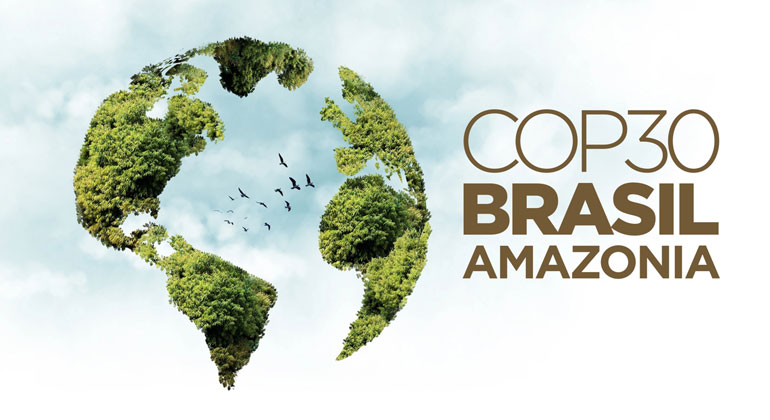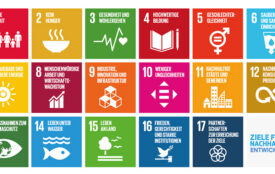COP30 must show that Climate Progress is Bigger than any Single Leader
Wuppertal Institute formulates expectations for this year’s UN Climate Change Conference in Belém.
From 10 to 21 November 2025, the 30th Conference of the Parties to the UN Framework Convention on Climate Change (COP30) will take place in Belém, Brazil. In view of geopolitical tensions and growing international divisions – including the US government’s renewed opposition to international climate agreements – COP30 is under particular pressure. The conference must prove that ambitious climate protection remains possible even without the US.
This year’s World Climate Conference is taking place against a backdrop of increasing international tensions: The Trump administration is trying by all means to slow down the energy transition not only nationally but also internationally – and is also pursuing a decidedly confrontational course in trade policy. The European Union and China are also increasingly imposing restrictions on international trade. In addition, geopolitical tensions have continued to rise due to the wars in Ukraine and Gaza. Added to this are social polarisation tendencies in many countries around the world and the deliberate spreading of misinformation, which make ambitious climate policy much more difficult to implement today.
“In view of the global crises, COP30 must send a clear message that successful climate policy is not just a nice-to-have, but actually protects against further escalation of conflicts. Given the Trump administration’s obstructionist stance, it is all the more important that the international community continues to adhere to the Paris Climate Agreement and its goals even without the USA, and that it consistently pursues and accelerates the implementation of appropriate measures,” emphasises Prof. Dr.-Ing. Manfred Fischedick, President and Scientific Managing Director of the Wuppertal Institute. This commitment must also include the results of the first Global Stocktake (GST), which was completed in Dubai in 2023. The Dubai conference agreed for the first time that a global transition away from fossil fuels is necessary; the conference also agreed on targets for improving energy efficiency, expanding renewable energies and ending deforestation and forest degradation.
Nationally Determined Contributions still fall short of Paris targets
The central mechanism for achieving the climate protection targets are the Nationally Determined Contributions (NDCs) of the parties to the agreement. All countries must submit new NDCs for the period up to 2035 ahead of the COP – but so far, less than half of the parties have done so. Furthermore, the ambition level of the NDCs submitted so far is not sufficient to make an adequate contribution to limiting global warming to below 2 degrees Celsius, ideally 1.5 degrees Celsius. “The conference in Belém should therefore call on all countries to further improve their NDCs in line with the Paris Agreement and the results of the Global Stocktake,” says Wolfgang Obergassel, Co-Head of the Global Climate Governance Research Unit at the Wuppertal Institute, adding: “It is also extremely important that countries specify in their NDCs how they will contribute to the global goals agreed in Dubai. In addition, it makes sense to implement a monitoring mechanism to monitor the actual achievement of these goals and to be able to take corrective action if necessary.”
Integrated solutions for climate and biodiversity are necessary
“Since the conference is taking place on the edge of the Brazilian rainforest, it would send a strong signal if the Brazilian COP presidency were to use this opportunity to highlight the interconnection between the climate and biodiversity crises and to promote greater cooperation and integration with the Convention on Biological Diversity,” emphasises Dr. Chris Höhne, Senior Researcher in the Global Climate Governance Research Unit at the Wuppertal Institute. “The climate and biodiversity crises can only be solved in an integrated manner, but so far there has been no common forum for negotiating such solutions.”
In addition, the issue of just transition could come more sharply into focus: Following progress in the interim negotiations in Bonn (Germany), there is growing hope for the development of a holistic mechanism that anchors aspects of justice as the basis for ambitious climate protection. Höhne adds that ambitious climate protection requires consideration of international and domestic justice aspects in order to promote climate protection on a broad basis of legitimacy. Only in this way can the necessary acceptance and participation for the required change processes be achieved.
Wuppertal Institute provides impetus for the future at side events
The Wuppertal Institute is organising a series of side events during COP30 to present its research projects and findings and to promote exchange with delegates and partners in the field. The thematic focus is on international carbon markets – i.e. those in which CO2 emissions are priced and carbon certificates are traded – and on transformative climate partnerships between the Global North and Global South.







